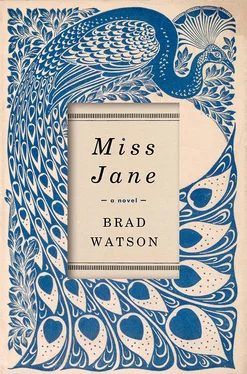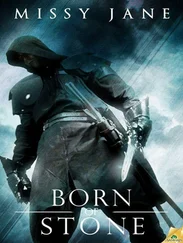“That’s about the only way I can be around horses,” Jane said.
“You don’t like horses?”
“It’s not that I don’t like them. I guess I just don’t trust them.”
“Well, that’s probably smart. Any one with any spirit is going to be a little wild. Anyway, that’s something I like about you. What I was talking about before.”
There , he seemed to say, that ought to be good enough for you .
“But I’m strange,” she said then.
He looked at her seriously.
“I kind of like that,” he said.
She felt like asking, What about how else I’m strange, not the way you’re talking about? About how everybody knows there’s something wrong with me?
But if it didn’t seem to be something that was on his mind, that was good enough for her, too.
And after he’d gone, and she’d sat awhile in the grove by herself, and after she had walked back and was almost to the house, she stopped. She felt something building up inside her that she didn’t recognize. She wasn’t sure if it was love, or some kind of terrible fear that she didn’t recognize at all. Or both. And the voice of her mother was in her head saying, Just what do you think you’re doing, daughter? What do you think all that’s all about?
MRS. IDA CHISOLM knew it was most likely the devil’s work, but it seemed like the only person she could go to who might — black magic or not — give her some kind of words to think on, to lean on, and no one would know, if she was careful. She took money she’d hidden away from sewing work she occasionally did so she could pay the woman well enough to keep her mouth shut. On the other hand, the more she thought about it, the less she really cared what anyone would think about her going to a fortune-teller lady who read palms and had visions. It was the latter part that was a little frightening, though. It was said that before Eugenia Savell’s husband died they would dress up and go into their parlor and she would play the piano, old-timey songs, and the ghosts of dead soldiers from the old war would drift down from the high ceilings and dance. Some kind of ghostly minuet. Well, if that wasn’t the devil’s presence it would be hard to say just what it was.
She rode into town with Mr. Chisolm next time he went in for the stockyard and store supplies. Went with him into Tom Lyle’s big grocery and wholesale, where he made his order to pick up on the way home. When that was done she told him she would stay in town and do a little window-shopping on her own. Maybe get some fabric from Klein’s.
“All right, then. I’ll be done in a couple of hours.”
“I’ll be at the corner there.”
He stood there looking at her.
“What?” she said.
“Don’t get yourself run over by a train or something.”
“Ought to hope I don’t hitch a ride on one.”
“To where?”
“Away.”
As soon as he’d rounded the corner in the truck, the two cows shuffling for footing, making the occasional forlorn moo, she caught the streetcar toward the west side and got off in a neighborhood of what was once grand homes, now all looking a bit spooky with their mostly Victorian styles, most built just after the war when Sherman had burned almost everything down. Mrs. Eugenia Savell’s house was one of the few exceptions, having served as a hospital for both Union and Confederate troops during the battle. Which was part of what made the story of dancing ghost soldiers even spookier: It was said the ghost ladies were dancing with soldiers blue and gray, infinitely polite to one another in death, all sanctioned murderous allegiance no longer lingering in the spirit world.
The Savell mansion sat on a hill on a large lot, surrounded by an ancient-looking fence that looked to have been made of iron spears. The gate stood open. The house itself was not in the Victorian style, but some kind of Greek Revival. It loomed there, columns crumbling, the oddly pink plaster faded, cracked, chunks fallen off here and there and lying in pieces in the weedy grass around the house. She made her way up the brick walkway, peavine weed growing up through it. A monstrous live oak stood to one side of the house and, ironically enough, a woman’s-tongue tree just out from the gallery, its dried pods clattering in a bit of breeze. Ivy was taking over the house, climbing the peeling columns and ruined plaster, curling into closed windows beneath what looked like rotted sash. She realized she didn’t even know if this woman was still alive, much less still plying her trade, if you could call it that. She only knew of it because her own mother had pointed out the house one time when she was smallish, told her the stories, scaring her. She never forgot it. Still, she was amazed she knew how to find the place, walked right to it as if she had a map in her mind. She lifted an old boar’s-head knocker and clanked it against the door a couple of times, and waited. She heard footsteps, not heavy but light. Then the doorknob rattled, turned, and the big door opened just an inch or so. She could see wiry white hair and a red-veined eyeball there. After it looked at her for a good long bit, the door opened and what had to be Mrs. Eugenia Savell stood there in a ratty nightgown and an oversized pair of worn men’s house slippers, ankles and shins a crazy map of blue vein lines and bursts. Her liver-spotted hand on the door was long, blunt ends on fingers with yellowed uneven nails. She stared at Ida Chisolm in a long silence, in the face, then up and down. Her face lined and wrinkled as old cottonwood bark. Her eyes, though red-veined and cupped in softer, bruised depressions, alert and intelligent.
“You’ve come to me about someone else,” she said.
“I have.”
“Come in, then. Follow me.”
The old house was heavily cluttered with something between junk and odd collectibles, so numerous they had to follow a path through it all, and through a big open kitchen filled with potted plants, some taller than a man, and into a sunroom in the back, filled with other, more exotic plants like elephant leaf and bamboo, and a ficus big enough to shade a picnic were it out in the yard.
“Sit,” the woman said, pointing to a sofa she’d hardly noticed for all the foliage. Mrs. Eugenia sat herself down in an old wooden wheelchair. When she saw the expression on Ida Chisolm’s face she cackled and said, “You know I’ll need it one day. Right now, it’s just kind of fun.” Then she said, straight-faced, as if she’d been asked a question, “It was my husband’s.” She leaned close, grinning, the wrinkles closing up around her cheeks and eyes. “I did covet it, while he was still alive.” Then went serious and said, “Is this about your husband?”
“No, ma’am.”
“Child?”
“Yes. Daughter.”
“How old is she?”
“Sixteen.”
“Don’t tell me any more. Let me have your hand.”
She took her visitor’s hand in her larger, almost leathery one, closed her eyes, and went silent. Ida could see her eyeballs moving back and forth behind the papery lids.
“Something is wrong with her?”
A lump came into her throat and she couldn’t speak. Tears came to her eyes and so she closed them. When she opened them again and wiped tears with the back of her free hand, she saw Mrs. Eugenia looking straight into them, saying, “She’s not sick.”
“No.”
“But she is afflicted.”
Nodded. Said, “I want to know if she will ever be better. Normal, like other girls. Women.”
She thought Mrs. Eugenia would close her eyes again but instead she continued to look deeply into hers. Then she dropped Ida’s hand and rolled her chair backwards, stopped, looked at her again, then out the window. Ida followed her eyes and saw that, oddly, the back yard was a beautiful garden, as immaculately tended for its flowers and hedgerows as the front was ignored. They sat there like that for what seemed minutes, silent. Until Mrs. Eugenia finally turned her chair by pushing on one wheel to face her again. The look of resignation in her face said everything.
Читать дальше












